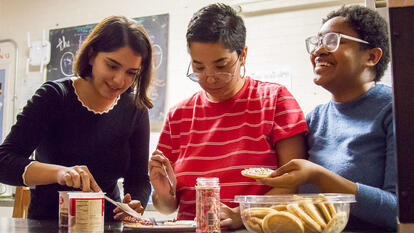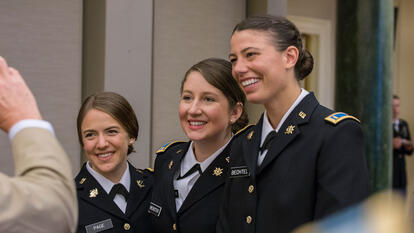Wellesley Professor on WGBH TV’s Greater Boston After North Korea Launches Intercontinental Ballistic Missile

The United States woke up on the Fourth of July this year to a barrage of media reports confirming North Korea’s claim that it had launched an intercontinental ballistic missile. The Trump administration responded by telling Pyongyang that the United States would use “the full range of capabilities at our disposal against the growing threat.” Following that warning, U.S. and South Korean forces held a joint military exercise July 5 during which they fired ballistic missiles in the waters along the Korean Peninsula’s east coast.
Later that day, the WGBH TV program Greater Boston invited three local experts to the show to discuss the situation: Wellesley’s Katharine H.S. Moon, Edith Stix Wasserman Professor of Asian Studies and professor of political science; Carol Saivetz, senior advisor at MIT’s Security Studies Program; and Gautam Mukunda, an assistant professor at Harvard Business School and research fellow at the Center for Public Leadership.
When host Jim Braude asked about possible options for bridging the gap between the United States and North Korea, Moon said, “The U.S. has to suck it up, and consider recognizing North Korea as a nuclear state, officially. We already treat it like a de facto nuclear state. That’s what the Washington people do, and that’s what North Korea wants. Then you enter disarmament and arms control talks. But Americans don’t want to go there, because it affects our geopolitical considerations about proliferation of nuclear weapons.”
Moon continued, “Another option is to be point-blank serious, and say, ‘North Korea, here are real goodies,’ meaning economic benefits. We’ve never spelled out economic benefits.”
Moon’s research encompasses the U.S.-Korea alliance, East Asian politics, inter-Korean relations, sociopolitical changes in North Korea migration, and women in international relations.
A nonresident senior fellow in the Center for East Asia Policy Studies at the Brookings Institution, Moon is the author of Protesting America: Democracy and the U.S.-Korea Alliance, which illustrates how democracy has given rise to Korean civil society activism relating to the U.S.-Korea alliance; the comparative politics of U.S. overseas basing; and the institutional and procedural changes needed to improve the management of the alliance.
She is currently working on a book that analyzes the impact of migration on South Korean democracy and foreign policy.



